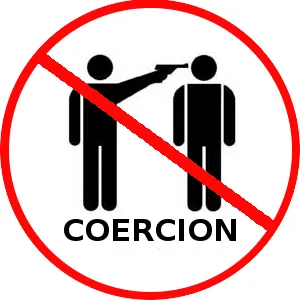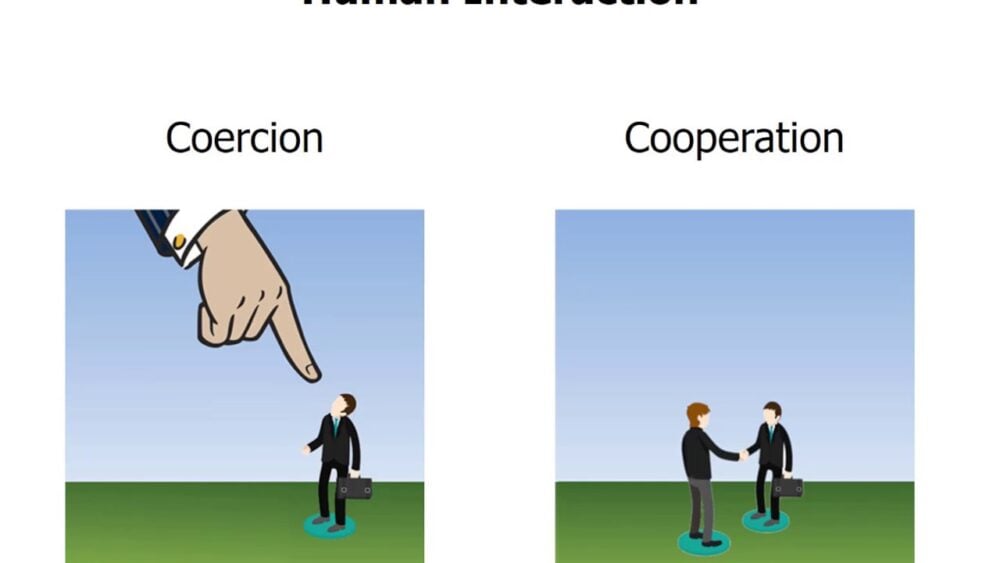Coercion meaning in law: legal terminology is one of the most searchable for knowledge and understanding of legal terms, coercion in direction means that you force a person to do a specific action without his consent, so the person is not given the option to do the show, which in most cases is a crime punishable by law in the constitution.
Coercion meaning in law
If the person was given a choice of whether he wanted to commit the crime or not.
Therefore, the law punishes a person who commits an act of coercion against another person.
Thus, in this article, we will talk about the crime of force in the law and the penalties set by the government and the constitution in determining the necessary punishment for the crime of oppression.
What is coercion?

meaning in law
coercion, meaning in direction, is the availability of things to be a coercive crime, where the crime must be against the perpetrator’s will and be wrong. It is the law.
The act can be physical or moral.
Therefore, coercion is divided into material force and moral oppression.
In the following lines, we will explain the difference between the two types of pressure.
read more: Elements of a will: 4 the rules of the will
physical coercion
Physical coercion is the non-consent of the perpetrator to do this act. Still, he is exposed to an external material force that he cannot resist, so he is subject to the person who performs the coercion.
It is also represented in carrying out forgery operations or signing forged documents or papers. Hence, coercion is the main reason and crime that the law must punish the person who does this.
moral compulsion

coercion means in law
Moral coercion is represented in two parts, a positive moral compulsion and adverse moral coercion, the difference between them will be explained in the following lines.
positive emotional compulsion
This type is represented in threatening a person to do something even without his will. His threat is to kill or expose him to harm or reveal one of his family members to break, which makes the person subjected to coercion to perform criminal acts to survive or protect him or protect his family members from being harmed.
coercion meaning in law: Negative emotional compulsion
It is represented in the person being forced to do nothing except by doing a sure thing, such as the doctor’s refusal to perform a specific operation before the patient pays his wages to double to him, under threat, so he cannot seek the help of another person besides him.
Types of legalization
In coercion, there is more than one type in the law. And oppression is forced, and pressure is not caused.
refuge coercion
This coercion is represented by threatening a person to inflict a severe danger to the person or money. This is characterized by the person’s lack of consent and desire to carry out the criminal act. Still, he is threatened until he does this act.
Unresolved coercion
The threat represents it, but this threat is devoid of harm to the body or money. Instead, it is described in the threat of beating, for example, but beating that does not expose the person to grave danger, or, for example, the threat of imprisonment or imprisonment, and also the disclosure of a specific thing that one fears or does not prefer to disclose…
The threat does not consist in harming the person only. The criminal threatens the person himself or threatens him with any other person in his family and family, such as his children, mother, or wife.
coercion terms

coercion meaning in law
Several specific conditions must be met to be considered a coercive crime punishable by law.
We will mention to you the most critical conditions that must be met in the coercion process, as they are:
When a criminal threatens a person, he must be able to do what he is threatened with.
The person who was threatened believes that the person who threatened him will do what he threatened him with as soon as possible and that he is unable to resist and is unable to escape from him or help someone else.
That fear is sent and transmitted in the soul of the person subjected to coercion and threat. The pressure must be on something private and not general, as the public and the unknown danger are not considered coercion spoiling satisfaction. The danger is grave for those against whom the threat and coercion fall.
And that the danger is close and likely to happen soon.
Punishment for defamation
The crime of slander and slander is one of the crimes punishable by law. Still, two conditions must be met for the offense to be represented as an accusation of defamation and libel in the law, first that the act must be a fact that is required to be specific and also that its goal is to reduce and respect the matter that Assigned to him Zayda contempt to belittle him and his dignity.
There are two pillars of this crime, a material pillar and a moral one.
The material pillar and the moral pillar
This pillar is represented in the availability of 3 essential elements described by the act of attribution; the subject of this fact determines the necessary punishment, as it is contempt and public contempt for the person.
The moral element is the intentional intent to commit this crime.
Read more: What is the inheritance tax threshold? 2 secrets you need to know!
Source: Wikipedia
In this article, we have talked about coercion meaning in law, we have explained what this term means in law, and we have also talked about the types of coercion and what are the necessary conditions for pressure to occur, as several needs must be met for the law to be held accountable as a coercive crime.
We have also talked about the crime of insult and slander, its pillars, and the necessary punishment for this crime in law.